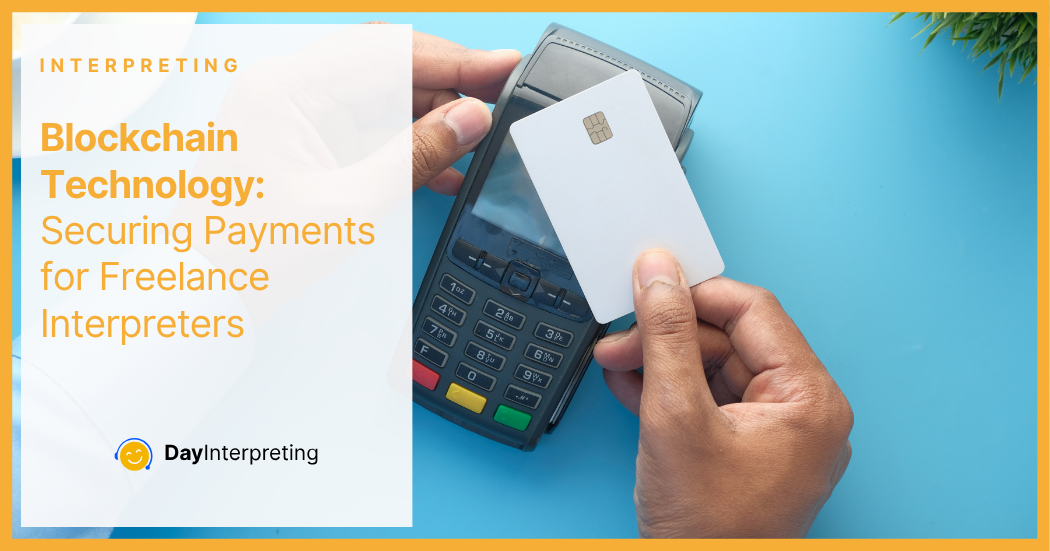For freelance interpreters, few things are more frustrating than chasing down payments after a job well done. Despite the professionalism and skill required in the role, interpreters working independently often face delayed compensation, unclear billing practices, or, worse, unpaid invoices. Now, in 2025, blockchain technology is emerging as a promising solution. Known primarily for its role in cryptocurrency, blockchain is transforming the financial infrastructure behind freelance work, bringing transparency, automation, and peace of mind to interpreters worldwide.
As platforms and language service providers begin to explore blockchain-powered payments, freelance interpreters may finally have access to secure, timely, and traceable compensation.
The Payment Problem in Freelance Interpreting
The interpreting industry is global by nature. Freelancers frequently work across borders, currencies, and time zones. While this creates a dynamic and diverse environment, it also presents significant challenges in terms of payment logistics.
Common issues include:
- Late payments from agencies or private clients
- Currency conversion delays or losses
- Lack of payment tracking or accountability
- Unclear or unenforced service agreements
- Invoicing disputes due to inconsistent terms
As Conference-Interpretation Asia has noted, many interpreters spend hours following up on payments, time they could be using to prepare for assignments, build client relationships, or simply rest.
Blockchain technology offers an elegant solution through smart contracts and immutable transaction records, which may be the game-changer the interpreting community has been waiting for.
What Is Blockchain Technology and How Does It Work?
At its core, blockchain is a decentralized digital ledger that records transactions across multiple computers in a way that makes them secure, transparent, and tamper-proof.
Unlike traditional payment systems:
- Transactions on a blockchain are permanent and verifiable.
- No central authority (like a bank) is needed to process the transaction.
- Smart contracts—self-executing agreements coded into the blockchain—automatically trigger payment once conditions are met.
These features make blockchain ideal for freelancers, whose work is often project-based and whose compensation relies heavily on trust. In addition, Vara license compliance support helps businesses navigate regulatory requirements smoothly, ensuring their operations remain secure and legitimate.
Smart Contracts: Automating Fair Pay
Smart contracts are the heart of blockchain’s appeal for interpreters. They’re essentially digital agreements that only execute once predefined conditions are fulfilled.
For example:
- A client hires a freelance interpreter for a three-hour legal proceeding.
- A smart contract is created, specifying the task, rate, and payment method.
- Once the interpreter submits proof of service, such as a signed timesheet or session log, the smart contract automatically releases payment.
There’s no waiting for manual approval, no room for excuses, and no uncertainty about when funds will arrive.
As Interpreter.io explains, smart contracts can protect both the client and the interpreter by clearly defining expectations and locking in compensation upfront.
Benefits of Blockchain Technology Payments for Freelance Interpreters
1. Timely Payments
No more 30-day waits or endless follow-ups. Blockchain-based platforms release payments instantly upon contract completion.
2. Global Accessibility
Interpreters anywhere in the world can receive payments in cryptocurrencies or stablecoins, eliminating the delays and fees associated with traditional wire transfers.
3. Transparent Terms
Every aspect of the agreement—from rate to delivery method—is coded into the blockchain and visible to both parties. This minimizes miscommunication and protects against scope creep.
4. Reduced Fraud
Once a transaction is logged in the blockchain, it cannot be altered. This ensures accurate payment records and protects interpreters from shady business practices.
5. Lower Fees
While payment processors and banks often charge hefty transfer fees, many blockchain systems operate with lower overhead, especially for international payments.
Real-World Adoption: Where Blockchain Is Already in Use
Blockchain adoption in language services is still in its early stages, but momentum is growing. Platforms like Linguist Toolkit and several newer start-ups are developing blockchain-powered marketplaces where interpreters and clients can collaborate with secure, transparent payment structures.
Agencies using blockchain are also starting to provide:
- Reputation scoring via public smart contract feedback
- Crypto wallets integrated into interpreter dashboards
- Payment notifications tied to blockchain events rather than email threads
Moreover, some conference interpreting agencies are exploring blockchain not only for payments but also for credential verification, ensuring that interpreter qualifications are securely validated.
Challenges and Considerations
Despite the promise, blockchain-based payments are not without hurdles:
- Cryptocurrency volatility: Some interpreters are hesitant to receive payment in crypto due to market fluctuations. However, stablecoins like USDC or USDT offer a more predictable alternative.
- Technical literacy: Not all interpreters are comfortable using digital wallets or navigating blockchain platforms—especially those new to tech.
- Regulatory uncertainty: Taxation and compliance laws for crypto payments vary by country and remain in flux.
- Adoption gap: Many clients and agencies are still unfamiliar with blockchain, meaning traditional payment systems are still the default for most assignments.
To overcome these issues, some platforms are offering hybrid models, where interpreters can choose between fiat and blockchain payment, depending on their preferences and comfort level.
The Road Ahead: Toward Financial Empowerment
As the language industry continues to modernize, interpreters stand to benefit from a more transparent and secure financial ecosystem. Blockchain and smart contracts won’t replace the need for trust, professionalism, and clear communication, but they will reduce the risks and streamline the processes that have long challenged freelancers.
For a profession built on precision and clarity, blockchain provides an unexpected but well-suited ally.
In the coming years, we can expect to see:
- More platforms integrating blockchain into payment systems
- Training programs for interpreters on using crypto wallets and smart contracts
- Greater global access for interpreters in underserved regions
- A shift in industry standards that prioritize accountability and financial security
For freelance interpreters, embracing blockchain isn’t just about getting paid—it’s about owning the future of their work with confidence.





0 Comments